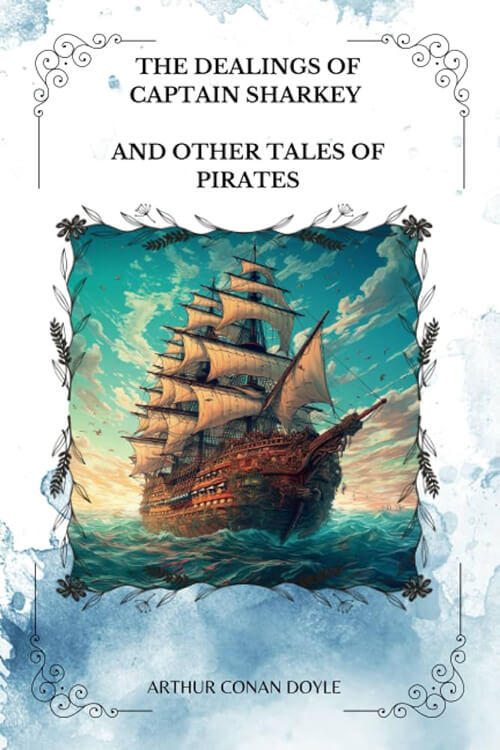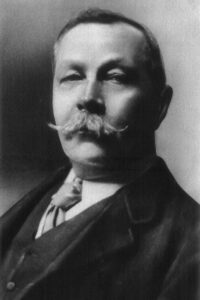
The Dealings of Captain Sharkey and Other Tales of Pirates
When the great wars of the Spanish Succession had been brought to an end by the Treaty of Utrecht, the vast number of privateers which had been fitted out by the contending parties found their occupation gone. Some took to the more peaceful but less lucrative ways of ordinary commerce, others were absorbed into the fishing fleets, and a few of the more reckless hoisted the Jolly Rodger at the mizzen and the bloody flag at the main, declaring a private war upon their account against the whole human race.
With mixed crews, recruited from every nation they scoured the seas, disappearing occasionally to careen in some lonely inlet, or putting in for a debauch at some outlying port, where they dazzled the inhabitants with their lavishness and horrified them by their brutalities.
On the Coromandel Coast, at Madagascar, in the African waters, and above all in the West Indian and American seas, the pirates were a constant menace. With an insolent luxury, they would regulate their depredations by the comfort of the seasons, harrying New England in the summer and dropping south again to the tropical islands in the winter.
They were the more to be dreaded because they had none of that discipline and restraint that made their predecessors, the Buccaneers, both formidable and respectable. These Ishmaels of the sea rendered an account to no man and treated their prisoners according to the drunken whim of the moment. Flashes of grotesque generosity alternated with longer stretches of inconceivable ferocity, and the skipper who fell into their hands might find himself dismissed with his cargo, after serving as boon companion in some hideous debauch, or might sit at his cabin table with his nose and his lips served up with pepper and salt in front of him. It took a stout seaman in those days to ply his calling in the Caribbean Gulf.
Such a man was Captain John Scarrow, of the ship Morning Star, and yet he breathed a long sigh of relief when he heard the splash of the falling anchor and swung at his moorings within a hundred yards of the guns of the citadel of Basseterre. St. Kitt’s was his final port of call, and early next morning his bowsprit would be pointed for Old England. He had had enough of those robber-haunted seas. Ever since he had left Maracaibo upon the Main, with his full lading of sugar and red pepper, he had winced at every topsail that glimmered over the violet edge of the tropical sea. He had coasted up the Windward Islands, touching here and there, and assailed continually by stories of villainy and outrage.
Captain Sharkey, of the 20-gun pirate barque, Happy Delivery, had passed down the coast and had littered it with gutted vessels and murdered men. Dreadful anecdotes were current of his grim pleasantries and his inflexible ferocity. From the Bahamas to the Main his coal-black bark, with the ambiguous name, had been freighted with death and many things which are worse than death. So nervous was Captain Scarrow, with his new full-rigged ship and her full and valuable lading, that he struck out to the west as far as Bird’s Island to be out of the usual track of commerce. And yet even in those solitary waters, he had been unable to shake off sinister traces of Captain Sharkey.
One morning they had raised a single skiff adrift upon the face of the ocean. Its only occupant was a delirious seaman, who yelled hoarsely as they hoisted him aboard, and showed a dried-up tongue like a black and wrinkled fungus at the back of his mouth. Water and nursing soon transformed him into the strongest and smartest sailor on the ship. He was from Marblehead, in New England, it seemed, and was the sole survivor of a schooner which had been scuttled by the dreadful Sharkey.
For a week Hiram Evanson, for that was his name, had been adrift beneath a tropical sun. Sharkey had ordered the mangled remains of his late captain to be thrown into the boat, “as provisions for the voyage,” but the seaman had at once committed them to the deep, lest the temptation should be more than he could bear. He had lived upon his huge frame, until, at the last moment, the Morning Star had found him in that madness which is the precursor of such a death. It was no bad find for Captain Scarrow, for, with a short-handed crew, such a seaman as this big New Englander was a prize worth having. He vowed that he was the only man whom Captain Sharkey had ever placed under an obligation.
Read or download Book
Arthur Conan Doyle
Sir Arthur Ignatius Conan Doyle KStJ, DL (22 May 1859 – 7 July 1930) was a British writer and physician. He created the character Sherlock Holmes in 1887 for A Study in Scarlet, the first of four novels and fifty-six short stories about Holmes and Dr. Watson. The Sherlock Holmes stories are milestones in the field of crime fiction.
Doyle was a prolific writer; other than Holmes’s stories, his works include fantasy and science fiction stories about Professor Challenger, and humorous stories about the Napoleonic soldier Brigadier Gerard, as well as plays, romances, poetry, non-fiction, and historical novels. One of Doyle’s early short stories, “J. Habakuk Jephson’s Statement” (1884), helped to popularise the mystery of the Mary Celeste.
Name
Doyle is often referred to as “Sir Arthur Conan Doyle” or “Conan Doyle”, implying that “Conan” is part of a compound surname rather than a middle name. His baptism entry in the register of St Mary’s Cathedral, Edinburgh, gives “Arthur Ignatius Conan” as his given name and “Doyle” as his surname. It also names Michael Conan as his godfather. The catalogs of the British Library and the Library of Congress treat “Doyle” alone as his surname.
Steven Doyle, publisher of The Baker Street Journal, wrote: “Conan was Arthur’s middle name. Shortly after he graduated from high school he began using Conan as a sort of surname. But technically his last name is simply ‘Doyle’.” When knighted, he was gazetted as Doyle, not under the compound Conan Doyle.
Doyle’s first novels were The Mystery of Cloomber, not published until 1888, and The Unfinished Narrative of John Smith, published only posthumously, in 2011. He amassed a portfolio of short stories, including “The Captain of the Pole-Star” and “J. Habakuk Jephson’s Statement”, both inspired by Doyle’s time at sea. The latter popularised the mystery of the Mary Celeste and added fictional details such as that the ship was found in perfect condition (it had taken on the water by the time it was discovered), and that its boats remained on board (the single boat was missing). These fictional details have come to dominate popular accounts of the incident, and Doyle’s alternative spelling of the ship’s name as the Marie Celeste has become more commonly used than the original spelling.
Between 1888 and 1906, Doyle wrote seven historical novels, which he and many critics regarded as his best work. He also wrote nine other novels, and—later in his career (1912–29)—five narratives (two of novel length) featuring the irascible scientist Professor Challenger. The Challenger stories include his best-known work after the Holmes oeuvre, The Lost World. His historical novels include The White Company and its prequel Sir Nigel, set in the Middle Ages. He was a prolific author of short stories, including two collections set in Napoleonic times and featuring the French character Brigadier Gerard.
Doyle’s works for the stage include Waterloo, which centers on the reminiscences of an English veteran of the Napoleonic Wars and features a character Gregory Brewster, written for Henry Irving; The House of Temperley, the plot of which reflects his abiding interest in boxing; The Speckled Band, adapted from his earlier short story “The Adventure of the Speckled Band”; and an 1893 collaboration with J. M. Barrie on the libretto of Jane Annie.






